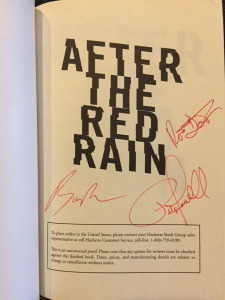Barry Lyga's Blog: The BLog, page 34
April 8, 2015
Episode 11: So. Much. Vomit.
Our eleventh episode is now live and available for your listening pleasure!
Barry admits to a mistake. Everyone is sick and everything sucks. Let’s go to the emergency room! Not letting your baby look at electronic screens…except for when you do. Deep influences. Sesame Street vs. Children of the Corn. Limping along in your writing. Morgan gets real about being a working mom.
As always, please give us feedback, follow us on Twitter, and rate us on iTunes!
After the Red Rain: Signed ARC Giveaway!
Hey, check it out…
Yes, indeed, that is a copy of the After the Red Rain advance reader copy, signed by Rob DeFranco, Peter Facinelli, and yours truly.
But let’s be honest — you don’t care about my signature. No, you want some of that Carlisle/Coop/Decker autographin’ love.
Well, I’m here to help.
I have in my possession five of these signed ARCs, and I will be giving them away on five different digital platforms between now and the release of the book on August 4.
May: Twitter giveaway
June: Facebook giveaway/Tumblr giveaway
July: Newsletter giveaway
What about April, you ask? April’s easy: I’ll be giving away a copy of the ARC to listeners of my podcast, Writing in Real Life! Just listen to episode 12, which will be posted between April 13 and April 15 for instructions on how to enter the drawing for the ARC!
(If you’re worried that you’ll forget to listen, either follow @WiRLPodcast on Twitter or subscribe to the podcast in iTunes.)
That’s it for now — keep following me on social media between now and July for other chances to win a signed ARC!
March 31, 2015
Episode 10: Babies & Brunch
Our tenth episode is now live! Double digits! Whoo-hoo!
Parenting achievement unlocked: Brunch with friends in the city with the baby. Milestones for writers published and unpublished. Defining “cruising along.” Morgan’s rockin’ Saturday night. When to give up on the book you’re writing. Barry announces a new book. Morgan adds to her online portfolio. How much of your first draft ends up in the final draft?
As always, please give us feedback, follow us on Twitter, and rate us on iTunes!
March 30, 2015
Billy’s Tattoos: An I Hunt Killers Tidbit
“Where do you get your ideas?”
I hear that question a lot, and the answer is that I’m not really sure (but read this guest post of mine anyway for some thoughts). Still, I know where some of the smaller ideas come from.
This Tumblr post reminded me of a tiny tidbit from the development of the I Hunt Killers series. So…
I came up with the name “Billy Dent” pretty early in the process of writing the series. It was there right from the beginning, really. And then something wonderfully serendipitous happened.
Many of you may know that I always try to put a Bruce Springsteen reference into my books. Sometimes it’s brutally obvious, as in Hero-Type. Other times, as in Goth Girl Rising, you gotta look for it.
The nature of I Hunt Killers dovetailed perfectly, though, with a specific lyric from the Springsteen song “Cautious Man:”
On his right hand Billy tattooed the word love and on his left hand was the word fear
And in which hand he held his fate was never clear
Pretty perfect, eh? I couldn’t have asked for a better reference. And the fact that it suggested an actual plot twist made it even better.
March 27, 2015
Faith and Vision
I was so happy to announce The Secret Sea. As I mentioned when announcing it, the book actually sold to Feiwel & Friends nearly two years ago, but for various reasons, we had to delay announcing it until now. I am over-the-moon in love with this book and I’ve been champing at the bit to talk about it.
This book excites me for so many reasons, most of which I can’t reveal because they’re spoilers. But it’s a fun cast of kids, it’s a great age group to be dealing with, and as I said in the previous post, it’s basically the kind of story I’ve always imagined myself telling. And now I have.
It also excites me because it almost didn’t exist. And I thought I would take a moment to tell you why.
There’s a persistent myth that once an author is published, he or she will always be published. This is untrue.1 The fact of the matter is, you can publish one book — or two, or ten, or fifteen — and then never another one again. As with anything, publishing can be fickle, whimsical, arbitrary, mercurial. Publishing one book is no guarantee of publishing another.
Since the publication of my first book, I’ve had three separate books I’ve tried to publish that no one wanted to take a chance on. One of those books came very early in my career.
My second novel, Boy Toy, had just come out and the critical acclaim was terrific. My agent took my third book — a middle-grade fantasy novel — and sent it off to my editor, confident (as was I) in her immediate and enthusiastic offer of sweet, sweet cash.
Instead, she declined. Just wasn’t her cup of tea.
I can be honest about this now, years later: I was shaken. My agent immediately submitted the manuscript to five other editors.
They all turned it down, too.
Now, since you’re reading this BLog, it should be obvious to you that my career didn’t end then and there. Fortunately, I’d been working on another project (which became Hero-Type) and that one was happily snapped up. Whew!2
A friend of mine said to me, “You were rocked by that rejection because you thought you would never hear no again after you heard yes.”
She was right. Like so many people, I thought getting that first book published was all that mattered, that afterwards I would publish whatever I wanted.
So. Not. True.
I tell you that so that I can tell you this:
About two years ago, a series of little notions and tidbits and thoughts that had been burbling away in the toxic acid pit of my subconscious finally burst through the surface and bobbed there, having coalesced into an actual Idea. Soon thereafter, this Idea began to take on the characteristics of a Story. I had some characters, a premise, the early kickings of a plot.
And I was excited. I didn’t know the whole story — not yet — but there was enough of it there that I was in love with it already. I didn’t want to wait to write this thing — I wanted to sell it immediately. This way, the book could be published as quickly as possible when I finished it.
Now, if you’re a new author, you pretty much need to write your whole book before someone will give you money for it. But if you’re established, you can sometimes get away with showing a publisher a taste of what’s to come — the first couple of chapters, say, and a synopsis of the rest of the book.3
Now, like I said, I didn’t have the whole story yet. But I felt like I knew enough of it. I wrote the first two chapters (they were heavy on character and atmosphere; they were also short, totaling a dozen pages) and then a synopsis. Since I hadn’t really figured out the rest of the book, though, the synopsis was long on suspense, short on actual answers. Imagine someone saying, “Here’s the most amazing story ever!” and then telling you the set-up and then saying, “I’ll tell you the rest some other time.”
Still, I thought that the premise itself was so strong, the characters so deep, the voice so clear, and my enthusiasm so bleedingly obvious on the page that everyone would overlook the fact that I hadn’t (yet) figured out, y’know, the major plot.
I showed it to my agent. She, too, was caught up in my enthusiasm.
We submitted those two chapters and the synopsis to a dozen publishers. We heard things like this:
“the plot is quite involved and has so much going on”
“there seem to be a lot of moving threads here”
“the plot is too complicated and ambitious. It isn’t clear from the sample chapter and synopsis how he would connect the two worlds”
Now, I want to make sure that you understand in no uncertain terms: I am not gainsaying or mocking or criticizing or denigrating these editors for their comments. For one thing, they are absolutely entitled to their opinions. For another, they’re not horribly wrong.
When you have a grand total of 12 pages of prose and what was, I admit, a rather lackluster synopsis, it’s tough to gamble with your employer’s money. I don’t blame a single one of these editors — or any of the others — for passing.
My answer to those concerns was — and is — I’m a professional writer. That’s how I’ll tie it all together.
But while it makes perfect sense for me to have confidence in my abilities, it’s just as understandable for editors who’ve never worked with me to have concerns. At this point in my career, I’d published some critically acclaimed books, but nothing that had blown up. I hadn’t won any awards. I hadn’t hit a bestseller list.4 I was a name and a promise and a few pages of words.
Trust me, I was saying. I know it’s not much right now, but trust me — I’ll make it awesome.
And they didn’t trust me, and I don’t blame them.
This post isn’t so much about “some people said no to me.” No, it’s really about the person who said yes. I had to tell you those nos so that you would understand why the yes is so important.
Liz Szabla read those 12 pages and that horrendously anemic synopsis and — not to put words in her mouth — she probably had somewhat similar reservations. She was probably concerned with the complexity and ambition of it all. How would Lyga make all of this work? Did he have the ability to pull it off?
Good questions. Fair questions. And, when spending money, necessary questions.
The only difference between Liz and those other editors is that Liz decided to trust me. She sussed out my vision from that submission package and even though there was much (so much!) that she couldn’t see or divine from it, she decided that the vision was worthy and worthwhile. I met with Liz before she officially made an offer on The Secret Sea, and we discussed the book. I admitted that it was — obviously — very much a work in progress. I suspected that the book would be long, I told her, and quite possibly very dark.
“Just tell your story,” Liz said.
And that, truly, is what this particular BLog post is about. Authors out there who just read the words “Just tell your story” may have gotten a bit misty-eyed. These are the words we long to hear.5 Because they communicate to us that the person saying them understands our vision. Or, if not understands it, at least has faith in it. Or faith in us.
This business is a business of people and relationships, someone told me once. And it’s true. I have been fortunate to work with some wonderful editors in my career thus far. Each one had a different style and different expectations, but they all had this in common: For the book in question, they had faith and they had vision. (In some cases, I had to remind them that they had faith! I told one editor who was leery about something in one of my books, “Look, you once said that you believed that I handled tough subjects gracefully. Trust me that I’m doing that here.” She agreed.) They had faith in me as an author and they had the vision to see that while we didn’t have a map, we would still get somewhere worth going.
“Just tell your story.”
Liz could see what the others couldn’t. And that is absolutely not a slam on them or their judgement. They just couldn’t see it. As I said before: I don’t blame them. I didn’t put my best foot forward and the price of that was a lot of rejections before I luckily stumbled on the editor who could see what was in my head.6
So, thank you, Liz. For imagining the gold covered over with all of the silt and mud. For believing in me. For believing in the story. For saying, “Just tell your story.”7
And thank you, Margaret. And David and Greg and Jody. And Alvina. I got here because of you guys, and there are so, so many other places to go.
I’ve written about my concerns about this fact here.Whatever happened to that other project? In retrospect, it wasn’t ready for prime time yet. I still love it and still go back to it every now and then. Someday it’ll be ready.This is how I sold Archvillain and Mangaman , as well as I Hunt Killers.With the sort of poetry that only happens in real life and is mocked in fiction, I hit the New York Times bestseller list literally the day we sold The Secret Sea.Along with “Six-figure advance.”Here my agent clears her throat and says, “Luckily??? I hand-picked Liz!” Which is true!And I did. And it’s long. And it’s quite dark after all…
March 26, 2015
My Next Book: The Secret Sea
 Oh, I have been waiting so long to tell you guys about this!
Oh, I have been waiting so long to tell you guys about this!
Barry Lyga’s THE SECRET SEA, pitched as a 21st-century WRINKLE IN TIME, about three friends who find themselves plunged into a world of quantum physics, a rare disease that only affects identical twins, and a mysterious fact about a real-life global catastrophe, to Liz Szabla at Feiwel and Friends, for publication in Spring 2016, by Kathleen Anderson at Anderson Literary Management (NA).
I sold The Secret Sea two years ago (almost to the day!). For various (boring) reasons, we had to keep it under wraps. But now it’s officially announced and I am beyond thrilled.
I am so freakin’ excited about this book! I can’t even explain it. It’s middle grade, but that doesn’t mean I’m pulling my punches. You’ll definitely know the guy who wrote I Hunt Killers was behind this.
But it’s so much more than that. There’s a scope to this book, a breadth that I’ve never achieved before in a published book. This is precisely the kind of story I always imagined myself telling when I was a kid and I daydreamed about being an author.
It took a long damn time, but it’s finally here. (Well, almost. You gotta wait ’til next year. Don’t complain — I’ve been waiting my whole life.)
I will have more to say on this very soon!
Clean Reading, Dirty Business
“I heard the sound of You in the garden, and I was afraid because I was naked; so I hid myself.” And He said, “Who told you that you were naked?”
– Genesis 3:10-11
Let’s start with something both amusing and sad.
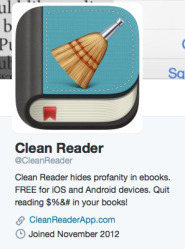 Off to your left, you’ll see a detail snagged from the Twitter page of an app called Clean Reader, which purports to “clean” your reading experience by allowing you to mask curse words in ebooks.
Off to your left, you’ll see a detail snagged from the Twitter page of an app called Clean Reader, which purports to “clean” your reading experience by allowing you to mask curse words in ebooks.
Do you see the irony?
Clean Reader wants to protect people from the horrors of curse words. Yet its Twitter bio forces a curse word into your head! “Quit reading $% in your books!” can only mean one thing. “$%” doesn’t stand for crap or garbage or junk. If it did, there’d be no need to mask it. It can only stand for the word shit. The clean-minded folks at Clean Reader are forcing everyone who visits them on Twitter to think the word shit.
But at least they’re not reading it, right?
“Who told you that you were naked?”
“I saw it on Clean Reader’s Twitter page, my Lord.”
Okay, let’s move on.
The existence of Clean Reader has caused something of an uproar in the writing community. Authors love words — words are all we have, folks — and the idea of people out there modifying and jerryrigging our words is anathema to us. It’s a moral poison. (I refer you to Chuck Wendig, Lilith Saint Crow, and Joanne Harris for more.)
As do many authors, I find the idea of Clean Reader noxious and its existence repugnant. I write specific words for specific reasons, and anyone bowdlerizing my books is changing them in ways I did not intend and, therefore, having an experience alien to that intention. Consequently, I am damaged (because if someone reads and doesn’t enjoy the book, they’ll blame me, not their own censoring), and the community is damaged (because there is no longer a common discussion point for the work in question if everyone can read their own version).
Beyond this, though, lies the inevitable slippery slope. I am no fan of slippery slope arguments, as all too often they are exhibitions of horrendous logical fallacies and catastrophic thinking. But I don’t think it’s outrageous, in this scenario, to envision a world in which one can not only remove objectionable words from art, but also objectionable ideas described by those words. Given advances in text processing and artificial intelligence, how far away are we from an app that makes black characters white? An app that removes homosexuality from a book via the opportune substitution of certain proper nouns and pronouns?
You see where this is going. Where it can go. Why it should be stopped here.
Is Clean Reader legal? Funny you should ask because clearly it’s something on the company’s mind as well. It’s right on their FAQ:
Is Clean Reader legal or does it break copyright law?We’ve discussed this with several lawyers and they have all agreed that Clean Reader does not violate copyright law because it doesn’t make changes to the file containing the book. All Clean Reader does is change the way the content is displayed on the screen. The user has the option of turning off the profanity filtering tool if desired. No changes are made to the original book the user downloads when they buy a book.
I’ll take their lawyers at their word and then say this: It doesn’t matter. I’m not suing for copyright violation, after all. I’m ticked off about the violation of my moral rights as an author.
Clean Reader defends itself by holding up its hands, palms out, chuckling, and saying, “Hey, man, we’re not changing anything! We’re just giving people the tools to do so!”
And I respond: “It doesn’t matter that you’re not doing the editing. You’re telling people it’s okay to do the editing…and it isn’t.”
The reasons why are varied and many. The authors I linked to above give excellent, full explanations that I won’t repeat here, as there’s no point re-stating what they’ve so ably stated. I urge you to read them.
I would like, however, to discuss two points I’ve not seen raised.
The first is that, quite simply, no one has a right to the art of their choice. If you find something in a piece of art displeasing, your only option is to disengage. And then I recommend you create something that you find more palatable, or support art that meets your standards.
The remedy to bad art is better art, not alteration.
The second point is more damning and more sensitive. Again, from Clean Reader’s FAQ:
One day our oldest child came home from school and she was a little sad. We asked her what was wrong and she said she had been reading a book during library time and it had a few swear words in it. She really liked the book but not the swear words. We told her that there was probably an app for this type of thing that would replace profanity with less offensive words and perhaps we should get her a tablet that she could use to read books with. To our surprise there wasn’t an app like this. The more we thought about this idea the more we wanted it to be a reality. Eventually we decided we would do all we could to bring Clean Reader to the world.
The Clean Reader app is morally vile, artistically bankrupt, and logically flawed. But this description of its origins points to a deeper problem.
Clean Reader folks, I’m speaking to you now not as an author, but as a fellow parent: You are terrible, terrible parents.
You are teaching your daughter that the world exists to please her. You are teaching her that when she finds something offensive in the world, she should have the ability — and she has the absolute, undeniable right — to change it as she sees fit. You are teaching her not to think critically, not to engage with and wrestle with difficult ideas, but rather to take the narcissistic step of battering the world around her into conformity to her own narrow views.
I’m sorry, but that’s bad parenting.
I find your business reprehensible and your mission pathetic, but it is your failure as parents that saddens me the most. Whether or not you like and can tolerate curse words is beside the point: The world does not exist for our pleasure and comfort. It exists to challenge us and temper us.
Teaching your child otherwise ill prepares her for the challenges of adulthood and citizenship.
You had two great options when confronted by your daughter. First, you could have told her, “We understand that you find those words objectionable and we respect that. That means there are going to be books and movies and such that you won’t want to experience. Fortunately, there’s a slew of such things that meet your criterion of no swearing, and you can enjoy them.”
Or, you could have said, “We understand how jarring it can be to encounter those words, but maybe you could take a moment to think about them and think about why the author used them. Maybe it’ll give you a deeper appreciation for the book. If not, you can always put it down and read something else.”
You did neither. You tried to have it both ways. You took the easy way out. You abrogated your duty.
There’s no app to fix that particular problem.
P.S. to authors: Email jared@cleanreaderapp.com and cc: support@inktera.com to request your books be removed from the in-app Clean Reader store. To their credit, they did so immediately when I contacted them. (Thanks to Lilith Saint Crow for the tip.)
March 25, 2015
Episode 9: “Can you do me a favor?”
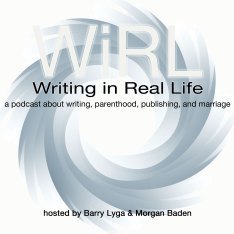
The ninth episode of Writing in Real Life is now up and available for your listening pleasure!
When do you stop reading a book? (Other than at the end, smart-ass.) Do you have to finish a book you start reading? Why? What is wrong with us as readers? Morgan disses Moby Dick. Barry scams the system. Morgan discovers freedom. Why aren’t episodes of Law & Order available on every flight? How do you decide which book to read next? Morgan’s love connection with Taylor Swift. Leia once again trolls her parents, sleep-wise. And Barry cheats at Recommended Reading. (Of course he does.)
Rate us on iTunes, follow us on Twitter, and be sure to send us feedback/topic suggestions!
March 20, 2015
Channels Dying? Good!
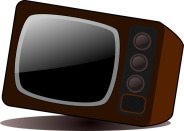 Over on Medium, tech guru M.G. Siegler discusses coming changes in the TV industry wrought by the internet, as well as by new players such as Apple shaking up the status quo. I agree with much of what he says. This bit jumped out at me, though:
Over on Medium, tech guru M.G. Siegler discusses coming changes in the TV industry wrought by the internet, as well as by new players such as Apple shaking up the status quo. I agree with much of what he says. This bit jumped out at me, though:
Another side effect is that certain channels, when unbundled, are going to die. Those handful of channels myself and the majority of others want currently subsidize the other, more niche channels. I suspect we’ll see some of those try to re-bundle themselves (Travel + Food Package, etc) but a lot of channels are going to go away.
In some ways that sucks. But it is what it is. Big changes require big changes. And some casualties.
I don’t think “that sucks” at all. There are a billion TV channels right now and quite frankly, most of them are crap. They regurgitate the same “reality” bilge over and over again, empty entertainment calories to binge on. Background noise while you fold the laundry.
Those channels that are currently 90% filler and 10% moderately interesting will go away. With any luck, the 10% interesting stuff will migrate to a channel that has also been forced to discard its crap, as quality consolidates. The end result? Fewer channels with a higher signal-to-junk ratio.
Of course, with my luck, the 90% will survive and congregate, and the good stuff will be sloughed off…
March 17, 2015
Episode 8: Blurbs! Blurbs! Blurbs!
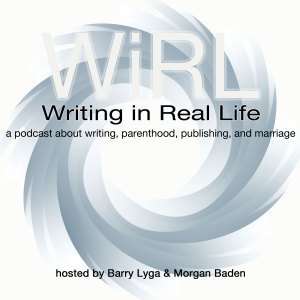 The newest episode of “Writing in Real Life” has been posted for your listening pleasure!
The newest episode of “Writing in Real Life” has been posted for your listening pleasure!
Leia offers her rebuttal on the topic of sleep training. Authors shifting genres, and the fans they may disappoint. Morgan leaves a book on the stoop. What’s up with blurbs, anyway? — The Blurb Economy. Publicly revealing Morgan’s Star Wars ignorance. Barry proselytizes “no compromises” when it comes to storytelling. Plus: An update on Morgan’s revision, and Barry decides which book to write next.
As always, please check out the show notes, rate us on iTunes, follow us on Twitter…and offer feedback!
The BLog
- Barry Lyga's profile
- 2185 followers


